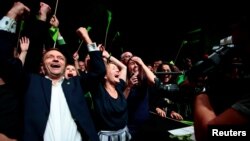Norwegians voting in local elections abandoned major parties in record numbers on Monday, according to early counts, opting for a plethora of smaller groups in the latest show of political discontent in Europe.
While Prime Minister Erna Solberg's ruling Conservatives were on track for their worst performance in regional voting since 2003, the top opposition Labour Party's support could dwindle to record lows, broadcasters NRK and TV2 reported.
The election boosted a broad range of parties, including Socialists, Communists, the Greens and the rural Centre Party, as well as the pro-motorist FNB, which dedicates itself to opposing congestion charges and other road tolls.
Although regional votes have no impact on the composition of parliament, and a general election is two years away, the growing rural-urban divide and a backlash against government reforms make it more difficult to govern, analysts say.
Among the decisions driving discontent were the forced merger in recent years of several municipalities, along with unpopular decisions to reorganize the police and hospitals, leaving some communities with less access to public services.
Last month, Solberg's four-party Cabinet came to the brink of collapse over disagreement on whether to pay for roads and public transport with more tolls on drivers, a major election topic.
"The government parties will likely see their lowest combined support on record," said Johan Giertsen, a law professor whose nonprofit Poll of Polls website has become a go-to site for election data.
Solberg's Conservatives and her government partners, the Liberals, the Christian Democrats and Progress, looked set to win just 34% of the vote combined, collectively losing 9 percentage points from four years ago.
Historically, an electoral swing of that magnitude would have benefited the largest opposition party, but Labour backed several major reforms and could itself lose more than 8 points in the election, dropping to around 24.5%.
Instead, the top gainer would likely be the Centre Party, seen surging to a record 14.7% from 8.5% four years ago on a wave of support that will see it capture the mayor's office in dozens of rural towns.
The Greens and the FNB, polar opposites on the environment and transport policies, were each set to make solid gains in cities.
If the 2021 vote for parliament were to show a similar outcome, Solberg would lose her narrow majority, while Labour leader Jonas Gahr Stoere would face complex coalition talks with centrist and far-left parties.
"If anything, it points to a change of government (in 2021), but the polarisation of the electorate has also made it harder to predict," Giertsen said.






